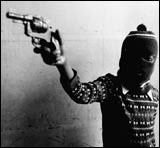Presenting an era
Sara Manuelli looks at Dennis Morris’ photography of 1970s black youth culture – a rare chance to see this era’s under-represented black history

“I don’t like reggae… oh no, I love it…” sang white pop band 10cc circa 1975. The song may have reflected a black music-loving mood, but life for a black youth in 1970s Britain wasn’t at all like a pop song, it was hard. Enoch Powell was ranting his racist rhetoric, signs in shops and pubs were saying “No Blacks, No Irish, No Dogs”, and, contrary to the expectations of those Empire Windrush pioneers who crossed the Atlantic to find fortune here, the streets of London were not – as black critic Stuart Hall wrote – “paved with gold”.
Dennis Morris’ latest exhibition at the Tom Blau Gallery in London, Growing Up Black, is a series of previously unpublished photographs depicting black youth life in London, Manchester and Birmingham in the 1970s.
Dennis Morris was born in Jamaica but grew up in London’s Hackney/ Dalston area when it wasn’t fashionable loftville that it is now, just a bleak part of east London. Known in his neighbourhood as “Mad Dennis”, he would roam around London, camera in hand, while the other kids were playing football. At the early age of 12, he accidentally photographed a PLO demonstration – his photograph made the front page of The Daily Mirror. This was just the beginning of Morris’s road to success…
Whizz-kid Morris waited hours for Bob Marley to turn up at the record sound check at the Speaky Easy Club. The reggae star was so taken back by Morris’ determination that he invited him along on the tour to take pictures of him.
Since then, Morris has made a name for himself in the music industry, documenting among many, the tours of Bob Marley and The Wailers, the Sex Pistols, and Oasis, working for magazines such as Rolling Stone, People and Time. He even had a stint as art director for Jamaican label, Island Records, where he signed up poet Linton Kwesi Johnson.
The exhibition features a series of strong, black and white, documentary-style shots, offering a glimpse into a rarely acknowledged urban world. Unlike 1980s cultural studies, which theorised issues of British black identity and today’s black culture magazines such as Untold, British black street culture in the 1970s was scarcely represented. Music was the preferred medium in black culture; the visual arts had very few spokespeople. However, Morris was there, at that moment in time, living and photographing it.
His pictures are a striking mix of churchgoers, local thugs and street youth. In particular, the show reminds us of the Black House, a centre for homeless black kids set up in Holloway, north London by Michael X and funded by John Lennon. Equipped with a library about black history and a community centre where kids could listen to bands or lectures, the Black House was a refuge and an inspiration for black consciousness.
Also on show is a photograph of British reggae band Steel Pulse, with two of the members clad in Klu Klux Klan gear. Considered too contentious at the time, the photograph was never published. While the afro haircuts, slim-fit suits and defiant posing of some of the subjects have a specific 1970s feel about them, the aesthetic quality of the photographs is timeless. Not only do they depict conditions such as racism and emargination, which are far from resolved in our daily urban landscape, they also act as a reminder for our historical amnesia about Britain’s black history.
The exhibition is at the Tom Blau Gallery, London SE1 from 29 June.
Exhibition sponsored by Ilford, Joe’s Basement and Camera Press.
-
Post a comment



